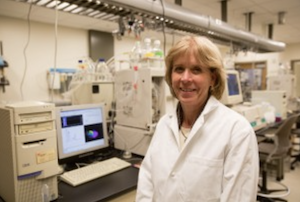Burrows Research published in PNAS
It might be wrecking the climate, but CO₂ is actually good for your cells

On November 26, 2024, the Proceedings of the National Academy of Sciences, or PNAS published the study “CO2 protects cells from iron-Fenton oxidative DNA damage in E. coli and humans.” The research is led by Cynthia J. Burrows, Distinguished Professor, Thatcher Presidential Endowed Chair of Biological Chemistry, and her team in the Burrows Laboratory.
Aaron Fleming, a research associate professor, and Justin Dingman, a doctoral candidate, both members of the Burrows Laboratory, are coauthors.
Brian Maffly, a science writer at the University of Utah Communications, wrote the article detailing the Burrows’ research in the @TheU,
Burrows’s lab has discovered that bicarbonate doesn’t just act as a pH buffer but also alters the Fenton reaction itself in cells. Instead of producing chaotic hydroxyl radicals, the reaction instead makes carbonate radicals, which affect DNA in a far less harmful way.
Brian Maffly, a science writer at the University of Utah Communications, wrote the article detailing the Burrows’ research in the @TheU, titled "It might be wrecking the climate, but CO₂ is actually good for your cells".
Read more here.
The Metabolomics Core Facility and qPCR instrumentation at the HSC Genomics Core at the University of Utah supported the research, which was funded by the NIH/National Institute of General Medical Sciences.
